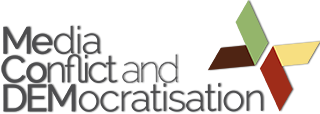A literature review by Rebecca Pointer, Tanja Bosch, Wallace Chuma and Herman Wasserman on civil society, political activism and communications in democratisation conflicts is now available.
Download at: http://www.mecodem.eu/publications/working-papers
Executive Summary
Against the background of MeCoDEM Work Package 5, “Civil society, political activism and communications in democratisation conflicts”, this working paper examines the role of civil society organisations in democratisation. The paper particularly focuses on: how the media covers civil society activities; how civil society organisations communicate; and the potential of new Information and Communication Technologies (ICTs) for delivering democratic change. Based on the literature review, the following observations emerged:
- It is not always clear that civil society and the state are playing separate roles or occupying separate terrains — depending on the state form, civil society can be inter alia embedded in state structures, working openly with the state, have a limited role in demanding services from the state, in active open opposition to the state, or working underground and hidden from view.
- Civil society cannot always be regarded as a democratising force — while it can play such a role, depending on context, it can be violent, and in some instances even opposed to broad-based equal rights for all. In addition, civil society groups might be focussed on minimalist demands — not broad or deep societal change.
- While some of the literature delineates between social and political activism — where political activism is directed at the state and social activism focuses on a range of causes, such as environmentalism, gender and LGBTIQ rights, and services such as housing — in the countries explored under this study, activism could not be neatly divided into one type or the other.
- Although there may be variations from one context to the next, the reality of conventional ‘news values’ informing news production in the legacy media mean that democratisation conflicts (or any other conflict for that matter), are likely to be framed as ‘events’, with emphasis on the spectacle, and ‘official’ sources such as spokespersons are likely to be given prominence even when their lived experiences are not integral to the conflict. Therefore, the underlying causes and complexities of civil society contestation are unlikely to be explored in the mainstream media.
- Though a range of factors limit activist access to the media, the media is not an un-budging monolith — at times it is receptive to calls for change, especially if an organisation achieves broad support through both media and non-media activities. Activists can also deploy their own “media”, which can involve a range of cultural activities and products, including newsletters, banners and pamphlets, films and photographs, clothing such as t-shirts, dramatic productions, etc..
- While ICTs and social media have risen as prominent terrains where civil society contestation can play out, these ICTs do not work in isolation, but in relation to other forms of communication — including mainstream media and interpersonal communication — so the impact of ICTs on contestation and democracy depends on the media, social, economic and political context in which they are deployed.
